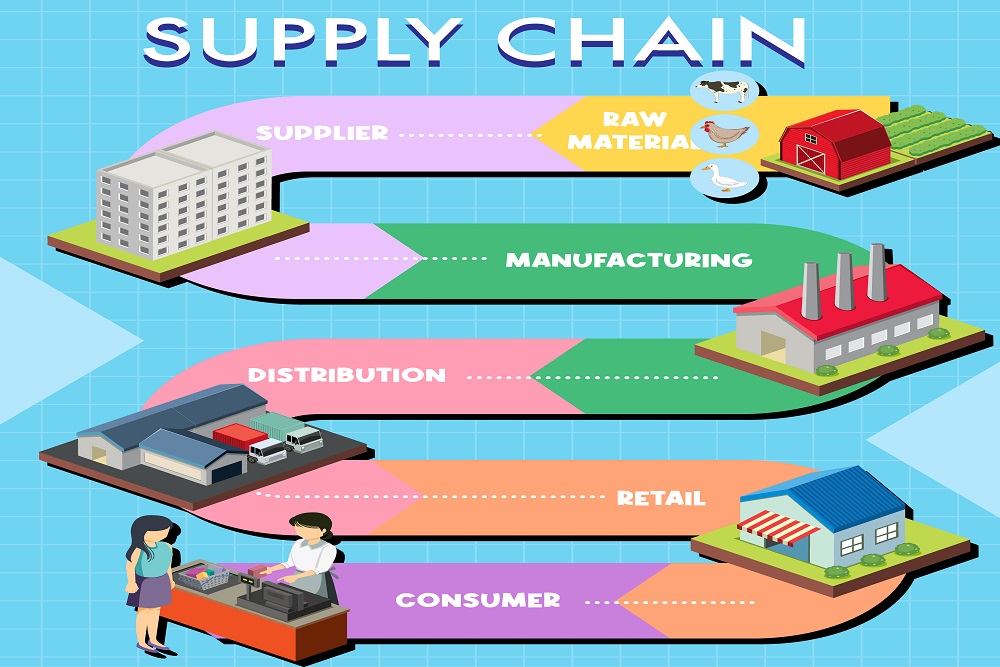What is supply chain management (SCM)?

Strong 8k brings an ultra-HD IPTV experience to your living room and your pocket.
In today’s interconnected world, supply chain management is a term you’ll often hear, but what does it really mean? At its heart, supply chain management refers to the coordination of the flow of goods, information, and finances from the initial stages of production to the final delivery to the customer. It’s a comprehensive process that ensures products are manufactured, stored, transported, and delivered in the most efficient and cost-effective way possible. Think of it as the invisible backbone of every successful business, quietly working behind the scenes to make sure everything runs smoothly.
Supply chain management plays a crucial role in the modern business landscape, where customer expectations are high, and competition is fierce. Without it, companies would struggle to deliver products on time, maintain quality standards, and keep costs under control. From the food on your plate to the smartphone in your hand, supply chain management is responsible for making it all happen.
Understanding the Basics of Supply Chain Management
Supply chain management is a broad field that encompasses multiple components, all working together to achieve one goal: satisfying customer demand. It’s not just about logistics, which focuses primarily on transportation and storage. Supply chain management is a more comprehensive approach, involving strategic planning, execution, and monitoring of all activities across the supply chain.
At its core, supply chain management is about creating value. By optimizing each step of the process, businesses can reduce waste, lower costs, and improve customer satisfaction. This holistic approach sets it apart from traditional business operations, emphasizing efficiency and collaboration at every level.
Key Components of Supply Chain Management
Supply chain management can be broken down into several key components, each playing a vital role in the overall process:
- Procurement is the first step, involving the sourcing of raw materials or products from suppliers. It sets the foundation for the entire supply chain by ensuring that high-quality materials are available at the right time.
- Manufacturing comes next, where raw materials are transformed into finished goods. This stage requires precise coordination to maintain quality and efficiency.
- Distribution is the process of moving products from the manufacturing facility to warehouses, retailers, or directly to customers. This step ensures that products reach their destination on time.
- Customer relationship management is the final piece of the puzzle, focusing on building trust and maintaining strong communication with customers. It’s about understanding their needs and delivering on promises.
Why Supply Chain Management Matters
Supply chain management is more than just a business function; it’s a strategic tool that can give companies a competitive edge. In a globalized economy, where products are sourced and sold across borders, an efficient supply chain is essential for success. Companies that excel in supply chain management often enjoy lower costs, higher profits, and greater customer loyalty.
One of the primary benefits of effective supply chain management is cost reduction. By streamlining operations and eliminating inefficiencies, businesses can save money on production, transportation, and inventory. This not only boosts profitability but also allows companies to offer more competitive prices to customers.
Another significant advantage is improved customer satisfaction. With the right supply chain strategies in place, companies can ensure timely delivery, maintain product quality, and respond quickly to changing market demands. This level of responsiveness is crucial in today’s fast-paced business environment, where customers expect nothing less than perfection.
Benefits of Supply Chain Management
Supply chain management (SCM) is a vital process for businesses that enables them to streamline operations, reduce costs, and improve customer satisfaction. Effective SCM ensures the smooth flow of goods, information, and finances from the initial stage of raw material procurement to the final delivery of finished products to customers. Here are some key benefits of supply chain management:
1. Reduced Operational Costs
One of the most significant advantages of SCM is its ability to lower operational expenses. By optimizing processes such as procurement, production, and logistics, companies can minimize waste, reduce inventory holding costs, and eliminate redundancies. This efficiency helps businesses save money and allocate resources more effectively.
2. Enhanced Productivity
Efficient supply chain management ensures that every link in the chain operates seamlessly. This synchronization of activities reduces delays and bottlenecks, leading to higher productivity. Employees and resources can focus on core activities, ultimately boosting overall output.
3. Better Inventory Control
SCM provides businesses with better visibility into their inventory levels. By implementing advanced tracking systems and demand forecasting, companies can avoid overstocking or understocking. This balance reduces storage costs and ensures products are available when customers need them.
4. Improved Customer Satisfaction
Timely delivery of high-quality products is a direct result of effective supply chain management. Customers are more likely to remain loyal to a company that consistently meets or exceeds their expectations. SCM enables businesses to respond swiftly to changes in demand, ensuring a superior customer experience.
5. Increased Agility and Flexibility
A well-managed supply chain allows businesses to adapt quickly to market changes, disruptions, or unforeseen events. Whether it’s shifting production to meet demand or rerouting shipments due to logistical challenges, SCM ensures that businesses remain agile and competitive.
Challenges in Supply Chain Management
Despite its many benefits, supply chain management is not without its challenges. Businesses face numerous obstacles in their quest to create a seamless and efficient supply chain. One of the most significant challenges is globalization. As supply chains stretch across borders, companies must navigate complex regulations, cultural differences, and geopolitical risks. This complexity can make it difficult to maintain control and ensure consistency.
Demand forecasting is another common challenge. Predicting customer demand is not an exact science, and inaccuracies can lead to overproduction, underproduction, or stock imbalances. These issues can disrupt the entire supply chain, resulting in wasted resources and dissatisfied customers.
Sustainability and ethical practices are also becoming increasingly important in supply chain management. Modern consumers expect businesses to prioritize environmental and social responsibility, which adds another layer of complexity to the supply chain. Companies must find ways to reduce their carbon footprint, source materials responsibly, and ensure fair labor practices throughout the supply chain.
Future Trends in Supply Chain Management
The future of supply chain management is shaped by technological advancements and changing consumer expectations. Automation is playing a pivotal role, with robotics, artificial intelligence, and machine learning transforming the way supply chains operate. These technologies enable faster production, improved accuracy, and greater efficiency.
Data analytics is another game-changer. By leveraging big data, companies can gain valuable insights into customer behavior, market trends, and operational performance. This information allows businesses to make data-driven decisions, optimize processes, and stay ahead of the competition.
Sustainability is also a growing focus in supply chain management. Companies are adopting greener practices, such as using renewable energy, reducing waste, and optimizing transportation routes to lower emissions. This shift not only benefits the environment but also enhances brand reputation and customer loyalty.
Conclusion
Supply chain management is the lifeblood of any successful business, ensuring that products are delivered to customers efficiently and cost-effectively. By understanding its key components, addressing its challenges, and embracing future trends, businesses can build resilient and agile supply chains that drive growth and profitability. Whether you’re a small business owner or part of a global corporation, investing in supply chain management is essential for long-term success.
FAQs
1. What is the primary goal of supply chain management?
The main goal is to optimize the flow of goods, information, and finances to deliver products efficiently and cost-effectively to customers.
2. How does supply chain management improve customer satisfaction?
By ensuring timely delivery, maintaining product quality, and responding quickly to market demands, supply chain management helps meet and exceed customer expectations.
3. What role does technology play in supply chain management?
Technologies like artificial intelligence, robotics, and data analytics enhance efficiency, accuracy, and decision-making in supply chains.
4. What are the biggest challenges in supply chain management?
Globalization, demand forecasting, and sustainability are some of the most significant challenges businesses face in managing supply chains.
5. Why is sustainability important in supply chain management?
Sustainability reduces environmental impact, promotes ethical practices, and enhances brand reputation, meeting modern consumer expectations.
Note: IndiBlogHub features both user-submitted and editorial content. We do not verify third-party contributions. Read our Disclaimer and Privacy Policyfor details.







